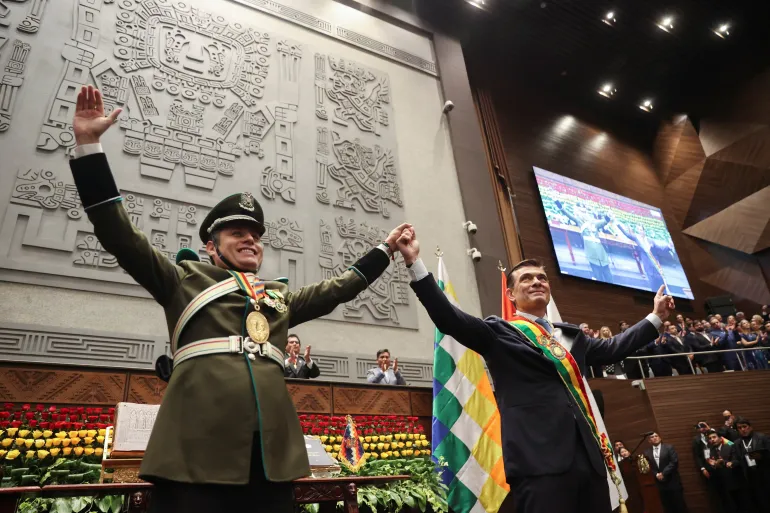Paz sworn in as Bolivia’s president, promises ‘capitalism for all’ | News
Rodrigo Paz faces Bolivia’s worst economic crisis in 40 years, with high inflation and a shortage of fuel and dollars.
Published On 8 Nov 2025
Rodrigo Paz has been sworn in as Bolivia’s president, ushering in a new era for the South American nation after nearly 20 years of governance by the Movement for Socialism (MAS) party.
Paz, the 58-year-old son of a former president, and a pro-business conservative, drew applause at the swearing-in ceremony on Saturday at the Bolivian seat of congress.
Recommended Stories
list of 3 itemsend of list
“God, family and country: yes, I take the oath of office,” said Paz, who won a run-off election last month.
In his inauguration speech, he later said Bolivia would now be open to the world after two decades of left-wing governance.
The Movement Toward Socialism party, founded by charismatic former President Evo Morales, had its heyday during the commodities boom of the early 2000s, but natural gas exports have sputtered, and its statist economic model of generous subsidies and a fixed exchange rate has collapsed.

Paz will have to address Bolivia’s worst economic crisis in 40 years, with year-on-year inflation at more than 20 percent and a chronic shortage of fuel and dollars.
The outgoing government of Luis Arce exhausted almost all of Bolivia’s hard currency reserves to prop up a policy of petrol and diesel subsidies.
On the campaign trail, the Christian Democrat Paz promised a “capitalism for all” approach to economic reform, with decentralisation, lower taxes and fiscal discipline mixed with continued social spending.
He also promised to maintain social programmes while stabilising the economy, but economists have said the two things are not possible at the same time.
Paz has promised to restore ties with the United States.
“Never again an isolated Bolivia, bound by failed ideologies, or a Bolivia with its back turned to the world,” Paz said during a ceremony attended by delegations from more than 70 countries and local VIPs.
Paz also announced after the election that his government will cooperate with all international organisations on security matters, including the US Drug Enforcement Administration, which Morales expelled from Bolivia at the end of 2008.
